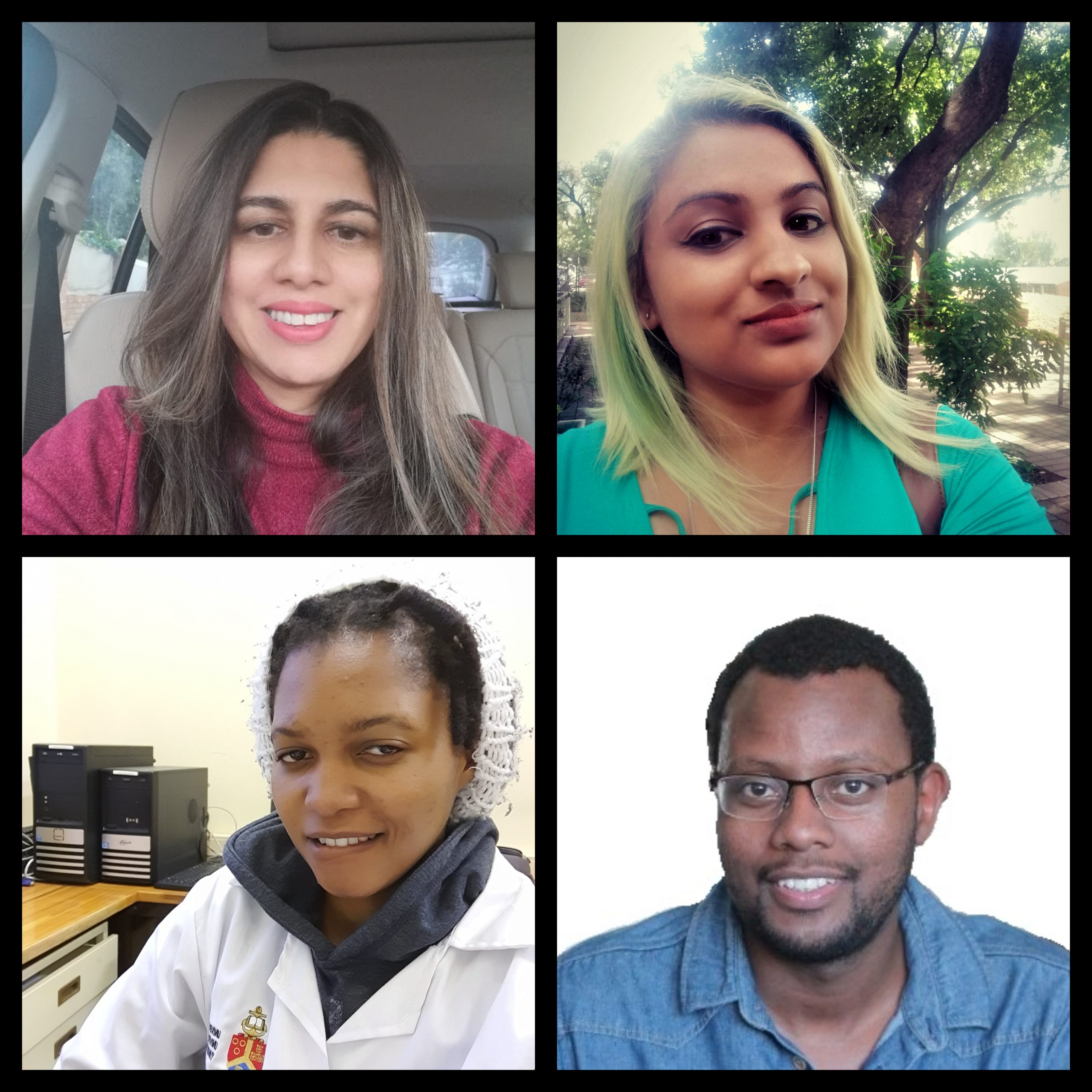Four South African researchers feature among the 20 new fellows from around Africa selected by the Food Systems Research Network for Africa to conduct research that will help transform the African food system.

The four new FSNet-Africa fellows are, clockwise from top-left, Assoc Prof Amiena Bayat, Dr Jarishma Gokul, Dr Frederic Isingizwe, and Dr Clarity Mapengo.
As if one was even needed, the recent looting of food and other goods in South African cities and communities served as a reminder that food insecurity in the country is a matter of national and urgent importance.
But food security and food systems are complex issues, made up of tangled and overlapping parts, actors and concerns. With this in mind, the Food Systems Research Network for Africa (FSNet-Africa) has embarked on research that will explore the many intersections between areas like agriculture, nutrition and livelihoods. Based at the University of Pretoria (UP), the project seeks to strengthen research into food systems in ways that will provide the kind of evidence that can shape policy, offer practical interventions, and ultimately support initiatives that will help Africa reach its Sustainable Development Goal (SDG) targets.
FSNet-Africa is a research excellence project funded by the Global Challenges Research Fund, and falls under a partnership between UK Research and Innovation (UKRI) and the African Research Universities Alliance (ARUA).
In a major recent development, FSNet-Africa has selected 20 early-career research fellows from six African countries (Ghana, Kenya, Malawi, South Africa, Tanzania and Zambia) to conduct multi-, inter- and transdisciplinary research to transform the African food system.
“Food systems include a range of actors and interactions,” explains Dr Elizabeth Mkandawire Research and network manager for FSNet-Africa. “One researcher alone cannot unpack all these issues with knowledge from a single discipline.”
With that in mind, the fellows will conduct research in areas as diverse as plant science, microbial ecology, consumer science, biotechnology, agribusiness management, social sciences and engineering. They will work in teams with mentors from Africa and the University of Leeds in the UK.
The fellows will include two researchers apiece from UP and the University of the Western Cape (UWC).
They are:
- Associate Professor Amiena Bayat (Institute for Social Development, UWC), who aims to investigate the nature of the urban agricultural system operating in Cape Town’s Philippi Horticultural Area (PHA).
- Dr Jarishma Gokul (Department of Plant and Soil Sciences, UP), who hopes to study the microbiome of indigenous fruit and vegetables and so improve plant health and sustainability.
- Dr Frederic Isingizwe (eResearch Office, UWC), who intends conducting research into data-driven technologies for African food systems. And
- Dr Clarity Ropafadzo Mapengo (Department of Consumer & Food Sciences, UP), who plans to look into the development of nutritious convenience foods that use indigenous African crops.
For each of these four researchers, the fellowship offers new opportunities and ambitions.
As a scholar, Bayat imagines exploring uncharted areas of research, which will reap all manner of rewards. “I know my students will benefit greatly from the knowledge gained on food systems research in Africa,” she says.
In turn, Isingizwe looks forward to the platform that the fellowship creates, with opportunities to build lasting research collaborations, communicate research to advise policies and educate communities. “The fellowship is an opportunity for me, as a young researcher, to expand my understanding of food systems on a deeper level by adopting holistic approaches to conducting research that is tailored for solving food security challenges and leading to direct positive impact on lives in Africa,” he says.
The opportunity to work with scholars from other disciplines is a huge boon to her work, observes Gokul. “My hope is that I can improve my ability to think differently and think broader, and utilise the larger research picture and opportunities to define or help generate new ideas in the area of indigenous plant and food systems,” she says.
“This fellowship makes me part of the global paradigm shift in the food production industry,” notes Mapengo. In addition, she looks forward to tapping into the collaborations and partnerships that come with the opportunity, she adds.
The fellowships started in July 2021 and will run until December 2023.
related Articles
#WomenOfUP: Prof Lise Korsten, the first female president of the African Academy...
Originally published by the University of Pretoria. UP’s Professor Lise Korsten has hit the ground running as the new and…
UP Drama celebrates World Food Day in a special way
World Food Day is an international day celebrated every year on 16 October to commemorate the founding of the United Nations Food and Agriculture…
Breede River Municipality hosts unique food security learning journey
“During two sunny winter days in early May, the Breede River Municipality (BVM) hosted a ‘learning journey’, an innovative…



